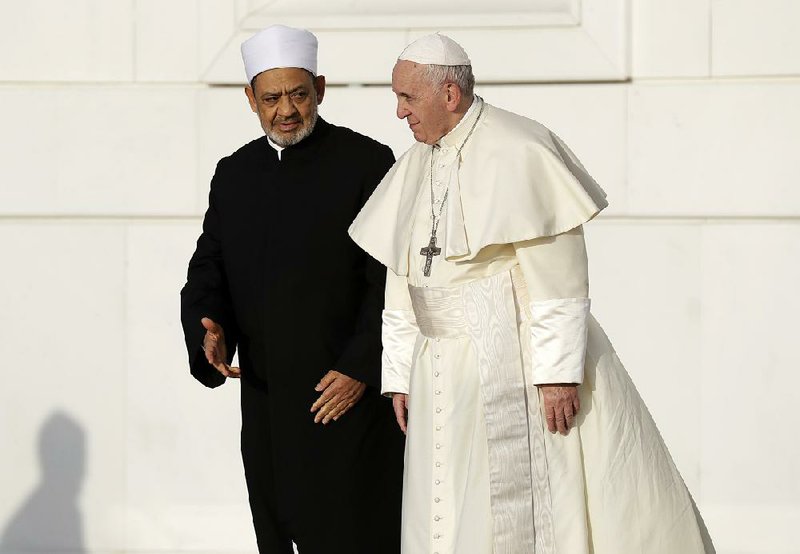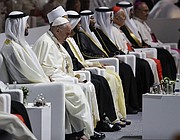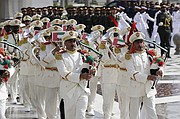ABU DHABI, United Arab Emirates -- Pope Francis used the keynote address of his roughly 40-hour stay in the United Arab Emirates to breach taboos Monday, specifically mentioning Yemen, where his hosts are engaged in a brutal war, and calling on countries throughout the Gulf region to extend citizenship rights to religious minorities.
The remarks were unusually candid for a pope who as a general rule does not criticize the country that hosts him and who avoids drawing attention to the issues that its rulers would rather not discuss. Rather, he often weighs in diplomatically before landing in the country or waits until he crosses the border to the next.
But on Monday, during the first visit by a pope to the Arabian Peninsula, where Islam was born, Francis was blunt in a speech before hundreds of leaders from a broad array of faiths on a day used to underscore the need for humanity to stop committing violence in the name of religion.
"Human fraternity requires of us, as representatives of the world's religions, the duty to reject every nuance of approval from the word 'war,'" Francis said at the towering Founder's Memorial in Abu Dhabi.
"Let us return it to its miserable crudeness," he added. "Its fateful consequences are before our eyes. I am thinking in particular of Yemen, Syria, Iraq and Libya."
Francis warned that the future of humanity was at stake unless religions come together to resist the "logic of armed power ... the arming of borders, the raising of walls."
"There is no alternative: We will either build the future together or there will not be a future," Francis told Abu Dhabi's powerful crown prince and hundreds of imams, muftis, ministers, rabbis and swamis gathered in the Emirati capital at a time when the UAE-backed Saudi war in Yemen has driven the Arab world's poorest country to the brink of famine.
"God is with those who seek peace," Francis added.
Later in the speech, the pope called for "societies where people of different beliefs have the same right of citizenship and where only in the case of violence in any of its forms is that right removed."
Citizenship rights in the United Arab Emirates are predominantly reserved for native-born Muslims. There are a million Christian migrants in the country, but throughout the larger region they are suffering persecution and bloodshed.
After his speech, Francis and Sheikh Ahmed el-Tayeb, the grand imam of an influential Egyptian mosque, Al-Azhar, signed a "Document on Human Fraternity." Then, Francis and el-Tayeb, head of the revered 1,000-year-old seat of Sunni learning, laid the cornerstones for a new church and mosque to be built side by side in Abu Dhabi.
The document, a sort of manifesto of peace for two religions whose adherents have spilled each others' blood for centuries, called upon "all concerned to stop using religions to incite hatred, violence, extremism and blind fanaticism, and to refrain from using the name of God to justify acts of murder, exile, terrorism and oppression."
The declaration added that "the pluralism and the diversity of religions" was willed by God, and, "therefore, the fact that people are forced to adhere to a certain religion or culture must be rejected."
And critically for a pope whose flock has seen members massacred in their churches, and for Muslim and Jewish minorities who have seen their houses of worship desecrated, the document asserts that the "protection of places of worship -- synagogues, churches and mosques -- is a duty guaranteed by religions, human values, laws and international agreements."
"Every attempt to attack places of worship or threaten them by violent assaults, bombings or destruction, is a deviation from the teachings of religions," it added.
The pope's speech included calls for greater education about other religions and peoples, a condemnation of "the seductions of materialism, hatred and prejudice" and the "fake news" that he suggested spread it.
But most of all, it was a forthright message from a pope whose own church, to the dismay of many of his supporters, still recognizes the difference between a just and unjust war. He called on religious leaders to put aside their sometimes violent differences and take the lead in bringing peace to dangerous times.
The pope, who has advocated for persecuted Christian and Muslim migrants and for the poor of all stripes -- whether they hail from the Middle East, Europe or the United States -- urged his fellow religious leaders to oppose "the arming of borders, the raising of walls."
The speech came on a day when Vatican officials confirmed that Francis had received an appeal from Venezuelan President Nicolas Maduro to facilitate dialogue in that country's deepening political crisis.
Francis' speech to the gathering of faith leaders was the highlight of his visit to Abu Dhabi. His trip concludes today with the first papal Mass on the Arabian Peninsula, a gathering expected to draw about 135,000 faithful in a never-before-seen display of public Christian worship there.
MEETING LEADERS
The pope's remarks in Abu Dhabi, delivered in Italian, were the finale of an interreligious conference about brotherhood and the culmination of a day in which the pope met privately and exchanged gifts with the leaders of the United Arab Emirates at the presidential palace and then reflected with Muslim leaders on peace at a giant mosque in the city.
At times, it seemed his hosts had not gotten the memo.
In the morning, a salute by 21 heavy artillery guns welcomed the pope's arrival to the presidential palace, located on the turquoise waters of the Gulf. Soldiers swinging their left arms while carrying machine guns in their right marched in green uniforms as a band played the Vatican and UAE anthems on bagpipes, silver trumpets and tubas.
The pope stood under a white gazebo, flanked by Abu Dhabi's crown prince, Sheikh Mohammed bin Zayed al-Nahyan, and by the Emirati vice president and prime minister, Sheikh Mohammed bin Rashid al-Maktoum. Above them, fighter jets screamed across the blue sky, trailing yellow and white smoke -- the colors of the Vatican flag.
As the smoke lingered above the palace and the gazebo, the pope greeted the Emirati delegation. A delegation of cardinals and bishops then greeted the royals.
The pope entered the palace where he signed the book of honor, writing that he sent the Emirati people "divine blessings of peace and fraternal solidarity." He received from the prince a framed 1963 decree by Abu Dhabi's ruler donating the land for the first Catholic church in the Emirates.
Later in the day, the pope greeted el-Tayeb outside the Sheikh Zayed Grand Mosque in Abu Dhabi. As the wind tossed around the hems of their robes, they entered together to meet the Muslim Council of Elders, a group of religious leaders specializing in interreligious dialogue.
As Francis began his trip, human-rights groups that are banned from the country urged him to use his visit to press for accountability by the Emirati leadership for atrocities in the war in Yemen and its repression of dissent at home.
"Despite its assertions about tolerance, the UAE government has demonstrated no real interest in improving its human rights record," Human Rights Watch said in a letter to Francis.
It was a reference to the UAE's often-stated claims of tolerance -- it has a minister for tolerance, is hosting the interfaith meeting Francis is attending and has declared 2019 to be its "Year of Tolerance." That respect for non-Muslim forms of worship, however, runs up against the political reality of media censorship, repression of political dissent and bans on proselytizing and conversion for Muslims.
Francis used his speech to insist on greater religious liberty in the UAE, saying freedom of worship was not the same as true freedom of religion. It was a critique of his Emirati hosts, who do allow the 8 million non-Emiratis living in the federation to practice their faiths -- but with limits.
"Without freedom, we are no longer children of the human family, but slaves," Francis said. True religious freedom "is not limited only to freedom of worship but sees in the other truly a brother or sister, a child of my own humanity whom God leaves free and whom, therefore, no human institution can coerce, not even in God's name."
Francis also noted that while foreign laborers have helped turn the country from a desert trading backwater into a global financial power, they are not necessarily made to feel welcome or allowed to become citizens. Human-rights groups have long denounced violations of basic rights and labor standards among the UAE's foreign workforce.
Information for this article was contributed by Jason Horowitz of The New York Times and by Nicole Winfield, Jon Gambrell, Aya Batrawy and Malak Harb of The Associated Press.
A Section on 02/05/2019


